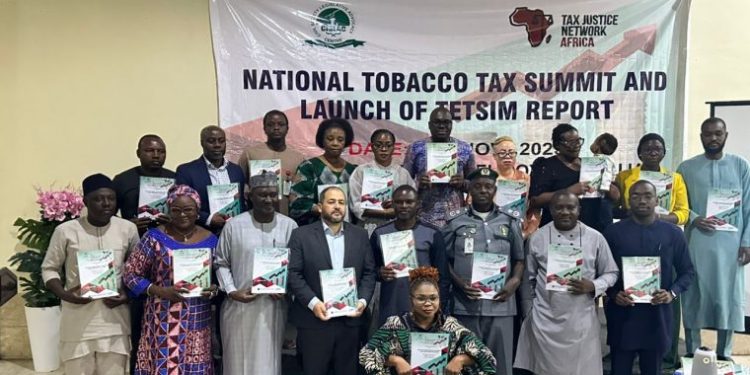As Nigeria prepares to implement a new tobacco tax regime by January 2026, the Civil Society Legislative Advocacy Centre (CISLAC) has launched the Tobacco Excise Tax Simulation (TETSiM) Report with a strong call for sweeping reforms to strengthen the country’s tobacco tax policy.
The report, presented during the National Tobacco Tax Summit in Abuja, was developed in partnership with the University of Cape Town and Tax Justice Network Africa. It projects that raising Nigeria’s specific excise tax on tobacco by 150% in the first year—followed by consistent annual increases—could cut cigarette consumption by 17.5%, boost real tobacco tax revenue by 183.7%, and avert thousands of tobacco-related deaths.
Dr. Corne van Walbeek, Director of the Research Unit on the Economics of Excisable Products at the University of Cape Town, stressed that maintaining current tax rates would leave smoking prevalence unchanged, rendering existing policy ineffective.
“Substantial tax increases are the only way to both save lives and grow revenues,” he said.
The report recommends retaining the current mixed excise structure while prioritising higher specific excise rates to offset inflation and curb affordability. It also calls on the government to pre-announce annual tax increases to ensure policy predictability and reduce industry interference.
Since 2018, Nigeria has operated a mixed excise tax system in line with the WHO Framework Convention on Tobacco Control (FCTC) Article 6. However, rates remain among the lowest in Africa.
CISLAC Executive Director, Auwal Musa Rafsanjani, emphasised the urgency of reform:
“While Nigeria has made progress since 2018, our tobacco tax rates are still far below ECOWAS and WHO recommendations. Increasing tobacco taxes will reduce affordability, especially among youth, improve public health, and generate needed revenue.”
Rafsanjani described tobacco and alcohol levies as “sin taxes”—tools to discourage harmful consumption and protect citizens’ health. Citing the WHO’s statistic that tobacco kills over 7 million people annually, he said taxation remains the most effective tobacco control measure worldwide.
Representing the Federal Ministry of Health, Abraham Agbons reaffirmed the ministry’s commitment to enforcing tobacco control laws, noting that “taxation is the fastest way to reduce tobacco use.”
A representative of the Federal Ministry of Finance confirmed that the government is finalising a comprehensive review of Nigeria’s excise regime to introduce stronger tax rates from January 2026, acknowledging that current rates are among the lowest in Africa.
The Nigeria Customs Service pledged full enforcement of any new policy, while Tax Justice Network Africa’s Amine Kamel commended Nigeria’s reform efforts, calling the TETSiM model a data-driven tool for shaping evidence-based tax advocacy across Africa.















